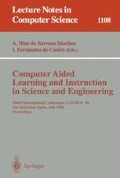Abstract
The main goal of the third stage of the SAFARI project is the delivery by an intelligent tutoring system (ITS) for a complete course. To achieve this goal, a subject-matter model, called CREAM, that can support course generation and delivery has been proposed. The acquisition of such a knowledge model requires to enable the designer with dedicated tools and methods. The purpose of this paper is to present the authoring environment (CREAM-Tools) we developped to support course and curriculum construction using the CREAM approach. This authoring environment consists of a course generation kit, of building tools and methodologies. Curriculums and courses produced with this environment are directly usable by an ITS. We also show ways other modules in an intelligent tutorial system can exploit the resulting curriculums and courses.
Preview
Unable to display preview. Download preview PDF.
References
Bloom, B. S. (1969). Taxonomie des objectifs pédagogiques.: domaine cognitif. Montréal, Éducation nouvelle.
Gagné, R.M. & Briggs, L. (1979). Principles of Instructional Design. (2nd edition). Holt, Rinehart and Winston, NY.
Gagné, R. M. (1985). The Conditions of Learning (4th edition). Holt, Rinehart and Winston, New York.
Gagné, R. M. (1993). Computer-Based Instructional Guidance. In: Spector, J.M., Polson, M.C. and Muraida, D.J. (Eds.): Automating Instructional Design: Concept and Issues.; pp. 133–146, ETD. Englewood Cliffs, N.J.
Klausmeier, H.J. (1990). Conceptualizing. In B. F. Jones and L. Idol (Eds.): Dimensions of Thinking and Cognitive Instruction; pp. 93–138; LEA, NJ.
Koehorst, A., M. (1994) Curriculum Graphs As A Backbone For Computer Supported Design And Delivery Of Education. In Proceedings of the 7th International Conference on Systems Research, Informatics and Cybernatics; pp. 31–36.
Lewis, R., Goodyear, P., & Boder, A. (1992) Just-in-time Open Learning: The background and objectives of a project supported by the European Commission under the DELTA programme; Occasional Paper NL/1/92, Neurope Lab.
Merrill, M. D. (1993) An Integrated Model for Automating Instructional Design and Delivery. In: J. M. Spector, M. C. Polson, and D. J. Muraida (Eds.): Automating Instructional Design: Concept and Issues; pp. 147–190, ETD. Englewood Cliffs, NJ.
Merrill, M.D. (1987). An expert system for instructional design. IEEE-Expert 2 (2) 25–37.
Nkambou, R., Gauthier, G., & Frasson, C. (1996). An Intelligent Tutoring System Interface Supporting Metacognition. In Proceedings of the 13th International Conference on Technology and Education, Orlando, NO.
Nkambou, R. & Gauthier, G. (1996). Un modèle de représentation du curriculum dans un STI. In Proceedings the Third International Conference on Intelligent Tutoring System, LNCS 1086, Springer-Verlag, Berlin.
Nkambou, R., Frasson, M. C., & Frasson, C. (1996). Generating Courses in an Intelligent Tutoring System. In Proceedings of the IAE-AIE'96 Conference, Japan.
Nkambou, R., Gauthier, G., Frasson, C. & M. Antaki (1995). Integrating Expert System in an Authoring System For Curriculum and Course Building. In Proceeding of the 7th International Conference On Artificial Intelligence and Expert Systems Application; pp. 485–490, San-Fransico, CA.
Nkambou, R., Lefebvre, B., & Gauthier, G. (1996). A Curriculum-Based Student Model For Intelligent Tutoring System. In Proceedings of the Fifth International Conference On User Modelling; pp. 91–98, Kailua-Kona, Hawaii.
Paquette, G., Crevier, F., Aubin, C., & Frasson, C., (1994). Design of a Knowledge-Based Didactic Engineering Workbench. In CALISCE 94, Paris.
Paris, S.G. & Winograd, P. (1990). How Metacognition Can Promote Academic Learning and Instruction. In B. F. Jones and L. Idol (Eds.): Dimensions of Thinking and Cognitive Instruction; pp 15–51, LEA, NJ.
Pirolli, P. & Russell, D.M. (1991). Instructional design environment: technology to support design problem solving. Instructional Science, 19 (2), 121–144.
Spector, J.M., Polson, M.C., & Muraida, D.J. (1993). Automating Instructional Design: Concepts and Issues. ETD. Englewood Cliffs, N.J.
Tennyson, R. D. (1993). A Framework for Automating Instructional Design. In: J. M.Spector, M. C. Polson, & D. J. Muraida (Eds.): Automating Instructional Design: Concept and Issues; pp. 191–214, ETD. Englewood Cliffs, NJ.
Webster, J. G. (1994) Instructional Objectives and Bench Examinations in Circuits Laboratories. IEEE Transactions On Education 37 (1) 111–113.
Author information
Authors and Affiliations
Editor information
Rights and permissions
Copyright information
© 1996 Springer-Verlag Berlin Heidelberg
About this paper
Cite this paper
Nkambou, R., Gauthier, G., Frasson, C. (1996). CREAM-Tools: An authoring environment for curriculum and course building in an intelligent tutoring system. In: Díaz de Ilarraza Sánchez, A., Fernández de Castro, I. (eds) Computer Aided Learning and Instruction in Science and Engineering. CALISCE 1996. Lecture Notes in Computer Science, vol 1108. Springer, Berlin, Heidelberg. https://doi.org/10.1007/BFb0022606
Download citation
DOI: https://doi.org/10.1007/BFb0022606
Published:
Publisher Name: Springer, Berlin, Heidelberg
Print ISBN: 978-3-540-61491-3
Online ISBN: 978-3-540-68675-0
eBook Packages: Springer Book Archive

